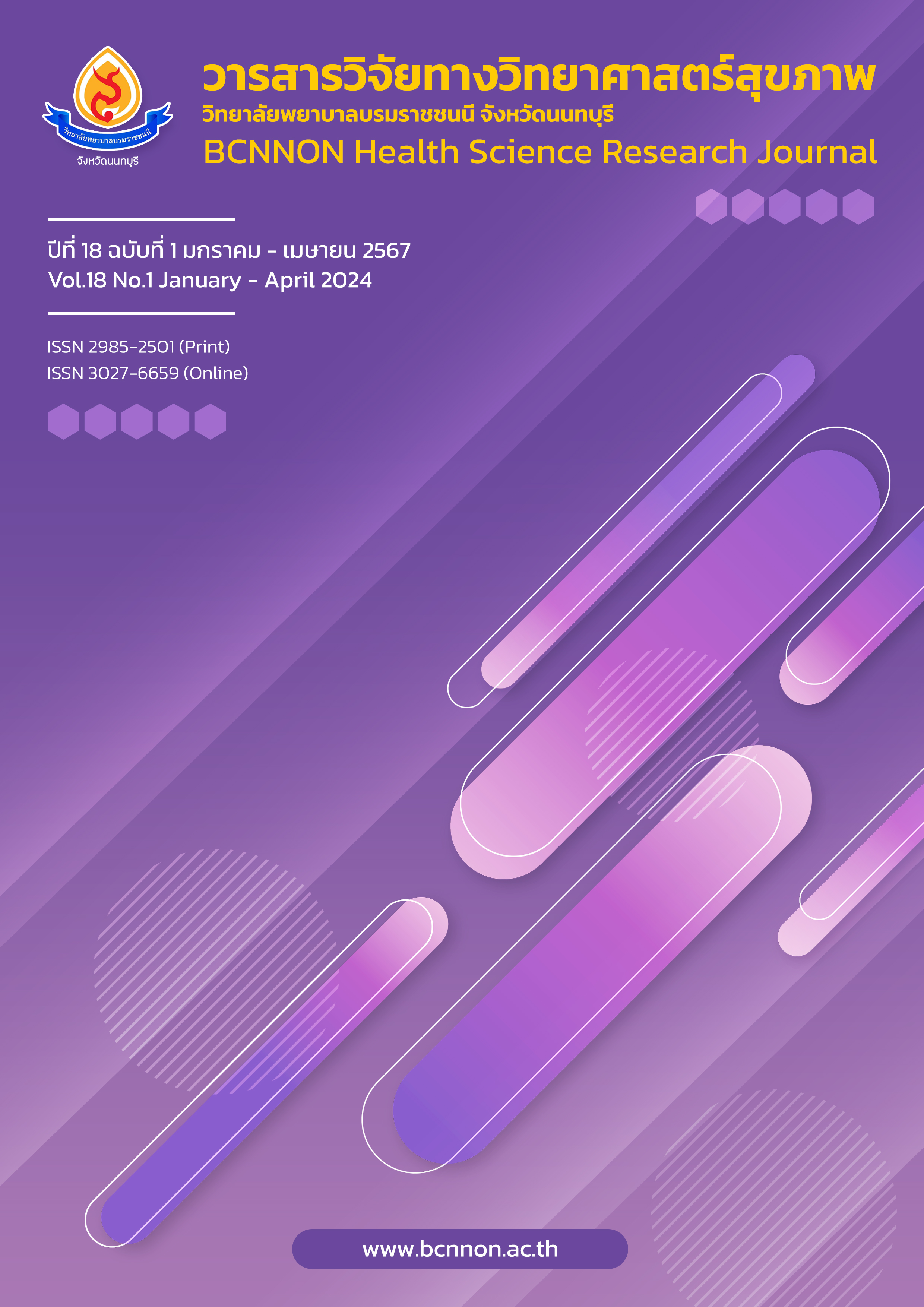Effects of psychological health promotion program using experiential learning on psychological self-care behavior and psychological well-being among older adults
Main Article Content
Abstract
Background: Psychological health promotion advocates for the psychological self-care behavior of older adults, leading to a healthier everyday life and an improved psychological well-being of older adults.
Objectives: This study aims to study the effects of the psychological health promotion program using experiential learning on psychological self-care behavior and well-being among older adults.
Methods: The sample for this quasi-experimental research was 60 older adults divided into an experimental and control group composed of 30 older adults for each group. The research instruments were the psychological self-care behavior questionnaire and the psychological well-being questionnaire. Cronbach’s alpha coefficients for them were .97 and .96, respectively. Data were analyzed using an independent sample t-test.
Results: The finding showed that the average scores of post-test on the psychological healthcare behavior and psychological well-being of the experiment group were significantly higher than the pre-test average scores at .05. Besides, the average scores for psychological self-care behavior and psychological well-being were significantly higher than the average scores of the control group (p < .05).
Conclusions: The psychological health promotion program using experiential learning can be used to develop the psychological self-care behavior and the psychological well-being of the elderly. Therefore, this program can be implemented to prevent mental health problems in the elderly within difference contexts involving the elderly.
Downloads
Article Details

This work is licensed under a Creative Commons Attribution-NonCommercial-NoDerivatives 4.0 International License.
บทความที่ได้รับการตีพิมพ์เป็นลิขสิทธิ์ของวิทยาลัยพยาบาลบรมราชชนนี จังหวัดนนทบุรี
ข้อความที่ปรากฏในบทความแต่ละเรื่องในวารสารวิชาการเล่มนี้เป็นความคิดเห็นส่วนตัวของผู้เขียนแต่ละท่านไม่เกี่ยวข้องกับวิทยาลัยพยาบาลบรมราชชนนี จังหวัดนนทบุรี และคณาจารย์ท่านอื่น ในวิทยาลัยฯ แต่อย่างใด ความรับผิดชอบองค์ประกอบทั้งหมดของบทความแต่ละเรื่องเป็นของผู้เขียนแต่ละท่าน หากมีความผิดพลาดใด ๆ ผู้เขียนแต่ละท่านจะรับผิดชอบบทความของตนเองแต่ผู้เดียว
References
Office of The National and Social Development Council. The national economic and social development plan (2023-2027). [internet]. 2022 [cited 2022 Jun 8]; Available from: https://www.ratchakitcha.soc.go.th/DATA/PDF/2565/E/258/T_0001.PDF. (in Thai).
Hogstel MO. Nursing care of the older adult. 3rd ed. Clifton Park, NY: Delmar; 1994.
Khamwong W, Hnoosawutt J, Yamboonruang T, Teunjarern Y. Correlation between personal factors, self-care behaviors regarding mental health status among the elders in Mueang Nonthaburi District, Nonthaburi Province, Thailand. Journal of Health Science Research. 2020;14(3):131-44. (in Thai).
Tongsuk Y, Vatanasin D, Hengudomsub P. Factors influencing psychological well-being among older adults. The Journal of Nursing and Mental Health. 2019;33(1):95-110. (in Thai).
Ryff CD, Keyes CL. The structure of psychological well-being revisited. J Pers Soc Psychol. 1995;69(4):719-27. doi: 10.1037// 0022-3514.69.4.719.
Hill L, Smith N. Self-care nursing: promotion of health. 2nd ed. Norwalk, CA: Appleton & Lange; 1990.
Wuthiphong J. Effects of psychological health promotion program on psychological self-care behavios [Thesis]. Bangkok: Chulalongkorn University; 2000. (in Thai).
Klinwichit S, Klinwichit W, Incha P, Klinwichit P. Mental health evaluation of elderly with chronic illness in community: Saensuk Municipality, Chon Buri, Thailand. Burapha Journal of Medicine. 2015;2(1):21-33. (in Thai).
Kolb DA. Experiential learning: experience as the source of learning and development. Englewood Cliffs, NJ: Prentice Hall; 1984.
Kolb AY, Kolb DA. Learning styles and learning spaces: enhancing experiential learning in higher education. Acad Manag Learn Edu. 2005;4(2):193-212. doi: 10.5465/ AMLE.2005.17268566.
Honey P, Mumford A. The manual of learning styles. 3rd ed. Berkshire: Peter Honey; 1992.
Pongpumma L, Kaewprom C, Yodprasert T, Khunkaew S. The effect of Participatory learning program on health promotion behavior among older person in a Bansuan district, Chon Buri. Boromarajonani College of Nursing, Uttaradit Journal. 2021;13(2):45-58. (in Thai).
Meethip N, Tumdee D, Bhuddhirakkul P. Effects of experiential learning on knowledge and screening practice and advice for hypertension among village health volunteers. Nursing Journal. 2016;43Suppl:104-15. (in Thai).


